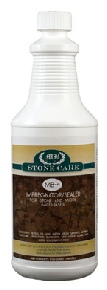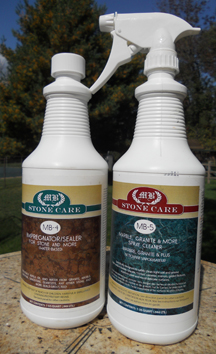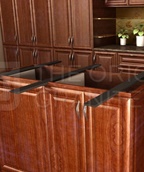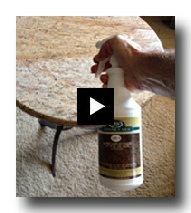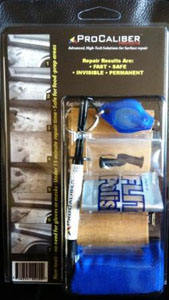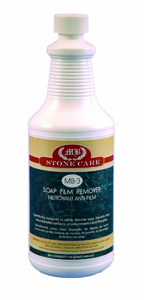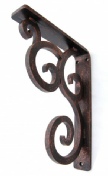15 Years and no need to reapply
Why should you seal granite? Sealing granite is such a misunderstood practice and misused marketing weapon. It’s the result of ignorance in the stone industry and malicious intent by sales people of competing countertop materials.
It’s generally believed that when a material is delicate and hard to maintain, it needs to be sealed. The stone industry set out to solve the concerns of staining granite countertops by soliciting chemists to find a sealer for stone.
Unfortunately, the chemists didn’t know the first thing about petrography. Granite sealer, the miracle in a bottle, became what I consider one of the most over-
See GraniteCarePro.com for professional sealing advice and how to seal granite. See MB Stone Care Professional Granite Products for cleaning and sealing products.
What is granite sealer anyway?
Sealers for stone (also known as impregnators) are below-
They are delivered inside the stone by natural absorption.Some stones absorb more than others. Granite sealer consists of a solid part, or resin, and a solvent or water carrier.
The solid stays in the stone and clogs the pores of the stone to keep liquid stains out. The carrier brings the solid into the stone and then evaporates.
One of the most important phases of the whole sealing process, is the thorough and complete cleaning and removal of any residue from the stone surface. This prevents any alterations to the color or the finish of the stone surface.
See Granite Sealers for suppliers of high quality sealer.
Reviews of granite contractors in your area!
The resin is absorbed for the purpose of sealing the stones natural pores.
Understand that an impregnator cannot, and in fact, does not, offer any protection to the surface of the stone –
Impregnator must go into the stone. But to do that, it has to be absorbed by it.
Several commercial granites don’t absorb anything due to their inherent density. Therefore no impregnator will ever go in.
If you apply it anyway, there’s the distinct chance that some of it will remain on the surface of the stone and it will be affected by spills, giving the impression that the stone is damaged.
This damage will appear in the form of “ghost water stains” or “water rings” confused for granite water stains. Some of the best stone surfaces available can be made to look “stained” by sealing them.
When in fact, the sealer is what is stained. Do not seal granite counter top stone that does not need it. See Granite Stain Removal for more on this.
Sealing Granite: Take the lemon juice test
So how do you know if sealing granite is necessary? See the Granite Lemon Juice Test.
Different granites each have their own needs depending on how porous they are. Some granites never need sealer and should never be sealed (black stones especially).
Others need several coats of sealer. Granite is very different than marble countertops or limestone countertops, so first make sure you are dealing with granite.
You can test your stone to see if it needs sealer by putting a few drops of lemon juice in an inconspicuous place. If dark spots appear quickly, the stone is potentially a problem since it is reacting with an acid.
Chances are it cannot be sealed properly. This is what happens with limestone counters. If the drops take a minute or so to be absorbed, you can protect the top with quality sealer.
If the lemon juice doesn’t absorb at all, the stone does not need to be sealed. Contrary to what you may have heard, sealing granite is not always a necessary part of granite counter care.
In fact, the performance of various granites can differ greatly. Some need sealer to prevent a granite stain while others don’t.
How to seal granite
Many granite companies use poor quality silicon or siloxane based sealers that require re-
We recommend and use a fluorocarbon alphatic resin sealer. Unlike silicon sealers, it will not evaporate or go through any type of natural deterioration. That is why the particular brand we use for all our sealing, MB Stone MB-
If you’re dealing with calcium based stones like limestone or marble, no matter what sealer you use, you cannot avoid the damage caused by acids. Anyone who tells you differently is wrong.
Is sealing granite easy?
Sealing granite countertops is as easy as spray on, let sit, and wipe off. There’s no polishing, buffing, or strange applicators. It literally takes minutes. And if you’re using a high quality alphatic resin granite sealer, you don’t need to keep applying coats year after year.
As a fabricator and installer, we always degreased countertops and gave them their final cleaning with denatured alcohol. Denatured alcohol, it turns out, does wonders for cleaning granite and cutting through film buildup on your counters. The result is the original shiny surface.
Cleaning granite countertops should only be done with specialized cleaners, not Windex or ammonia. The best performing product we have found is MB Stone Care MB-
Soap Film On Granite Countertops
If you have cleaned your granite tops with dish soap, you can remove the soap film buildup with MB-
What Is The Best Granite Sealer?
Legacy Brackets for granite supports

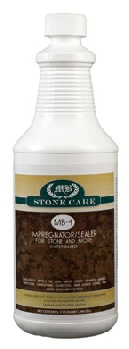
Is Your Granite Sealed Properly?
As professional granite installers, we provide MB-
We researched and tested several stone sealers before choosing MB-
Don’t trust your granite investment to anything else . . . but MB-
Why should you seal granite? Granite is a natural product and inherently porous. It can stain.
Many granite companies use poor quality silicon or siloxane based sealers that require re-
MB-
Applied properly, this sealer will last 10 to 15 years and you don’t need to reapply before then! Full instructions and you’re done in minutes! Click on “Sealing & Color Enhancing” on the MB Stone Care Site.
$47.45

Granite countertop support brackets
Questions? Contact GraniteCarePro
Return from Seal Granite to Granite Care Guide

